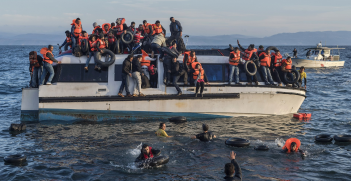European Union’s Foreign Investment Screening: Between Free Movement of Capital and National Security Interests

The COVID-19 pandemic has accelerated the global trend of tighter restrictions on foreign investments. The introduction of a new EU-wide foreign investment screening framework opens a new chapter in EU’s external relations with third states.
As a collective, the European Union (EU) prides itself for being the most open investment environment, with free movement of capital enshrined in the EU treaties as one of its fundamental freedoms. Foreign direct investment (FDI), in conjunction with smooth functioning of the EU internal market, has contributed to European economic growth. However, as Chinese FDI has been on the rise in Europe, peaking in 2016, concerns about the impact of these investments on national security interests have come into the fore.
The new EU regulation establishing a framework for the screening of FDI into the Union was adopted in 2019 and, following necessary adjustments, entered into force in October this year. The EU’s move towards the screening mechanism must be considered in a broader perspective, where international trade has been shifting from collaborative towards a multiplayer zero-sum game. With the greater involvement of the government as an economic player, economic security is increasingly seen as a matter of national security. The global pandemic has further exacerbated these concerns, with the European Commission warning that the economic aftermath could leave strategic sectors exposed to foreign takeovers.
In the European context, traditional investors from advanced economies (the US, Switzerland, Norway, Canada, Australia, and Japan) are still the dominant ones, controlling more than 80 percent of all foreign assets diversified across sectors. At the same time, the emergence of new investors concentrated in some sectors, among which China stands out, has prompted the adoption of the new EU regulation. While foreign acquisitions by state-owned companies still represent a small proportion, their share has been rapidly growing over the years, posing questions about unfair competition and security.
The difficulty in striking a balance between FDI openness and national security in the EU has been compounded by the complexity of the EU’s system of allocation of powers. On the one hand, the EU is endowed with an exclusive competence in the field of trade and FDI (for this reason, the EU is negotiating and concluding a trade agreement with Australia) whilst, on the other, the 27 member states are sovereign in restricting or prohibiting FDI for public order or national security reasons.
In essence, the new EU regulation establishes a cooperative mechanism between the member states at the EU level. While about a half of member states have their own FDI screening procedures, others have limited or no screening in place. The absence of EU legislation clearly had deleterious effects on the functioning of the internal market. For example, a foreign investor wishing to invest in Belgium could be blocked for national security reasons, while the same kind of investment could be welcomed by Croatian authorities since Croatia has no screening mechanism in place. A single EU investment regulatory scheme was deemed to be more transparent and effective than the diverging regulatory approaches of 27 member states.
However, the individual member states’ screening procedures remain in place, and the Commission has further called upon all member states to introduce fully-fledged screening at the national level. The new EU mechanism thus envisages a scheme for the exchange of information and “opinions” between the member states and with EU institutions, and not a screening of investment by the EU itself.
The regulation applies only to FDI from third countries (including Australia) and not to investment from member states. In addition, it does not cover short-term financial portfolio investment. Nevertheless, the Regulation applies to a broad range of sectors, defined as critical infrastructures (energy, transport, water, health, communications, media, data processing or storage, aerospace, defence, electoral or financial infrastructure, sensitive facilities, and crucial real estate) and critical technologies (AI, robotics, cybersecurity, energy storage, nuclear technologies, nanotechnologies, and biotechnologies).
The screening obligations are based upon several core principles: transparency of rules and procedures, ensuring investors’ access to legal remedies, and non-discrimination between third countries in the application of the investment screening procedure. However, the core aspects of the regulation concern procedural rather than substantive requirements, revolving around the principle of sincere cooperation between the member states and the Commission. Nevertheless, the final decision to allow or block the investment in question remains with the host member state.
The procedural obligations include the exchange of notifications and opinions. These requirements include different scenarios. For instance, in case of a Chinese investor intending to purchase a defence facility in France, the French authorities will be obliged to notify the other 26 member states about this intention, since this critical investment would be likely to adversely affect their national security. If the French authorities do not notify about the FDI at hand, other member states could provide their own opinion to the French authorities, which France would then have to take into account when making its final decision about the investment. In the case of a similar Chinese investment in Croatia – a member state which currently has no FDI screening procedure, the European Commission could jump into the fray by forwarding to the 26 other member states its own opinion about the desirability of the investment. The Croatian authorities would have to state their reasons in their final decision in light of the Commission’s opinion.
While the host member state has the last word, the restrictions placed on FDI from third countries must be grounded in valid reasoning, allowing investors to “seek recourse” for their compliance with EU law. It remains to be seen how this legal protection for investors will be implemented in practice. At least in principle, the EU’s shift towards formal legal procedures in FDI screening aligns with its vision of the rule of law in international trade and investment. Nevertheless, while the third country investor has the right to challenge the refusal of his investment, it is likely that any judicial interpretation of national security would be more favourable to the state authorities. Indeed, national security is a prerogative of the executive power, and thus courts are generally less willing to question it.
With the introduction of its own FDI screening framework, the EU follows the practice of other states, such as Australia, that have already had investment screening procedures in place for some time but are now introducing tighter restrictions. The EU’s move thus provides a further testament of a trend toward greater scrutiny of foreign investment in international trade. It also mirrors a contradiction: attracting while controlling foreign capital. For the EU, the additional challenge lies in balancing its proclaimed FDI openness with geopolitical interests, in addition to the checks-and-balance of the rule of law as its core value.
This article is part of the research project conducted with the Maastricht University, with the support by the Erasmus+ programme of the European Union.
Dr Ivana Damjanovic is an assistant lecturer at the University of Canberra and a visiting fellow of the Centre for European Studies, Australian National University.
Professor Nicolas de Sadeleer is a professor of EU law and a Jean Monnet Chair at the St. Louis University, Brussels.
This article is published under a Creative Commons Licence and may be republished with attribution.





